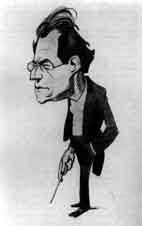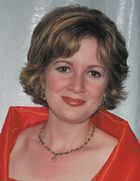
Date:
2 & 4 October 2004 at 20.00
Venue:
The Orpheum Theatre
Programme: Mahler, Symphony No. 3
Conductor: Bramwell Tovey Mezzo-soprano: Susan Platts Choir: Women of the Vancouver Bach Choir and Children's Chorus of the Bach Choir
 Ambitious
and emotionally draining, Gustave Mahler's Third Symphony offers
an exhausting range of challenges to performers and listeners alike.
Written in 1895-96, the symphony got a meticulous, full-bodied,
and goose-bump-raising
reading
by the
large
forces under Maestro Bramwell Tovey's sure, intelligent direction.
Choosing such a strut-your-stuff masterwork for the Vancouver Symphony's
opening concert
of the 2004-05 season
suggests a self-confidence
bordering
on hubris, but one fully justified by the richly coloured orchestral
playing and sensitive interpretation on offer.
Ambitious
and emotionally draining, Gustave Mahler's Third Symphony offers
an exhausting range of challenges to performers and listeners alike.
Written in 1895-96, the symphony got a meticulous, full-bodied,
and goose-bump-raising
reading
by the
large
forces under Maestro Bramwell Tovey's sure, intelligent direction.
Choosing such a strut-your-stuff masterwork for the Vancouver Symphony's
opening concert
of the 2004-05 season
suggests a self-confidence
bordering
on hubris, but one fully justified by the richly coloured orchestral
playing and sensitive interpretation on offer.
The opening mood of brooding tension, shot through with post-Romantic longing and passion, shifts into a contrarian blitheness and brightness, a schizophrenia characterizing the whole 90 plus minutes work. Pensive and dramatic moments contrast with an unbridled joyfulness that at times threatens to break into high jinks. Maestro Bramwell Tovey managed the transitions between doom -and-gloom and rollicking oom-pah-pah, effortlessly guiding the orchestra with a baton that on several occasions throughout the evening threatened to sprout flowers.
Mahler's chocolate-box charm and sly wit made for a second movement distinctly Germanic in character in its playful seriousness and serious playfulness. The movement, at first sight on the light side after the heavy- duty opening, brims with musical ideas, running the gamut from a veritable "Knees up, Mutter Braun" to characteristic Romantic expansiveness. Stylish and convincing playing, the evening's keynotes, were abundantly in evidence.
The third movement, a romp in the Wald , replete with cuckoos and woodland sounds, drew especially bright and exuberant playing from the violin section under new Concertmaster Mark Fewer -- another musical treasure -- whose assured, rich tone rang out in all his solo work. Big bright sounds with dramatic impact and finely etched details of the most delicate kind lay easily in the orchestra's reach.
The logical extension
from revelling in nature was an exploration of the human voice in  the
fourth movement, finding poetic expression in a song to words by Nietzsche.Susan
Platts, a young mezzo from Victoria in
the Maureen Forrester tradition, delivered a deeply felt, thoroughly
idiomatic, and beautifully articulated intensity, her exquisite voice
conveying the text's yearning and serenity to make her contribution
to this thoroughly fine evening a high point. Blessed with a gorgeous
voice, she gave unstintingly, relying on an impeccable technique to
convey nothing less than magic.
the
fourth movement, finding poetic expression in a song to words by Nietzsche.Susan
Platts, a young mezzo from Victoria in
the Maureen Forrester tradition, delivered a deeply felt, thoroughly
idiomatic, and beautifully articulated intensity, her exquisite voice
conveying the text's yearning and serenity to make her contribution
to this thoroughly fine evening a high point. Blessed with a gorgeous
voice, she gave unstintingly, relying on an impeccable technique to
convey nothing less than magic.
The final movement, relentlessly shifting in mood, gestures towards the transcendent as Mahler adds a chorus to his massed forces. The Women of the Vancouver Bach Choir performed with commitment, though the interpretation lacked some of the bite ordinarily given to this section. The work's philosophical character -- and Mahler never shies at wearing his ideas or his heart on his sleeve -- bursts forth unblushingly here, as the music moves from an energetic conversation about essential things to an outright defiance of transience and mortality.
This was performance to cause buzz -- bravi to the brass section among others -- and fill seats throughout the rest of the 2004-05 season. As an opener it was nothing less than a real ear-popper. Keep it coming!
© 2004 J. H. Stape